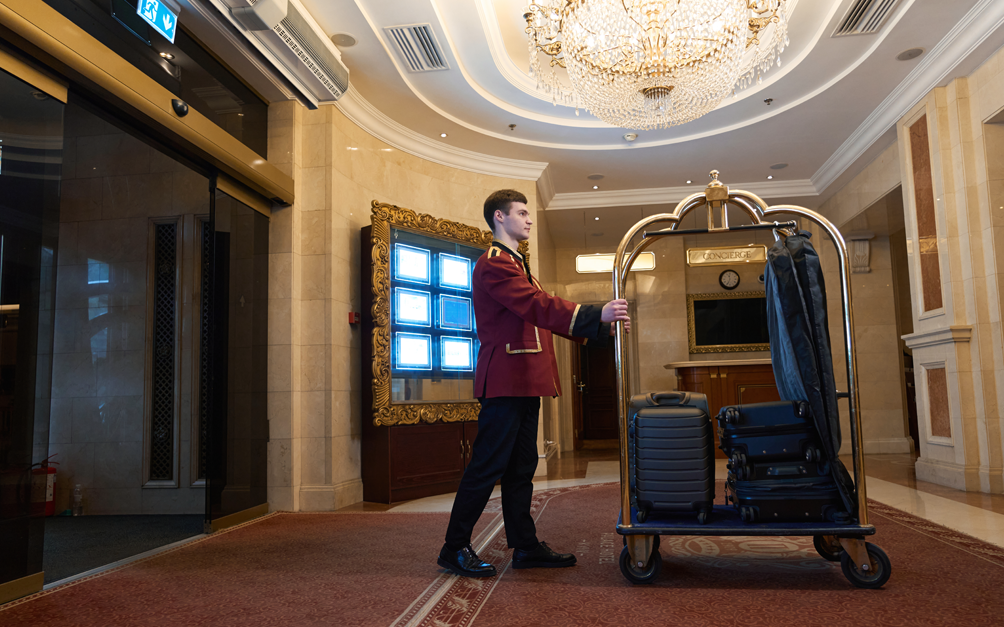
2024’s top challenges (and solutions) for the hospitality industry
Rising geopolitical tensions and inflation are exacerbating the challenges that the hospitality industry has been grappling with this year. While occupancy rates are bouncing back to pre-pandemic levels, the fallout of government and business policies that were implemented during the pandemic years will impact hoteliers’ upcoming plans.
Here are a few of the challenges that decision-makers will prioritize, as well as areas in which hospitality tech can make a difference.
- Staff shortages
The hospitality industry as a whole is struggling with attracting and retaining staff, which in turn is affecting hotels’ abilities to meet guest expectations. While HR departments are looking at policies such as flexible timings, better wages and hiring overseas staff, technology can help hotels assign staff in more optimal ways.
For example, Hudini offers online check-ins through mobile devices and self-service kiosks, making the arrival process faster and hassle-free for both guests and staff. This helps hotels divert front desk personnel to other guest-facing roles where face-to-face interactions can make stays more personalized and memorable. Such a solution can also improve the staff’s morale, since it helps them apply their skills in processes and situations that really matter.
- High inflation
Financial analysts are predicting that “inflation may remain higher for longer than expected”. This will squeeze household expenses and make customers rethink discretionary spending on holidays and luxury purchases. So, how can hotels still attract guests and claim a share of wallet?
Firstly, hotels will have to offer packages that are great value for money. Customers, especially in the millennial and GenZ guest segments, don’t mind spending on an exceptional experience. Hotels can consider not just improving service standards, but personalizing stays as well. Guest experience platforms like Hudini analyze data to curate unique stays for every guest, personalizing everything from F&B suggestions to itineraries. Hotels can also offer unbundled pricing through personalization, wherein guests only pay for the services they opt for.
Task automation at properties can streamline budgets towards hiring more experienced staff and creating great guest experiences. Hotels can also use AI-based algorithms to optimize dynamic pricing according to the season and room availability. While hospitality tech isn’t the only solution that hotels can deploy to attract guests at the right price, it can address issues effectively and at scale.
- Rising operational costs
An offshoot of inflation is the skyrocketing cost of food ingredients, fuel and other essentials that are critical for a hotel’s day-to-day operations. Hotels are trying cost-saving measures such as outsourcing laundry and housekeeping. On the technology front, motion sensors can help regulate electricity and air conditioning in unoccupied public spaces and rooms, trimming down a hotel’s energy bills.
Additionally, hotels are also tapping newer avenues to grow revenues. Hotel apps built by Hudini create new revenue opportunities by helping guests purchase add-ons and upgrades at every stage of their stay, not just check-in. Hotels can also explore anytime commerce and convert rooms and restaurants into digital storefronts from where guests can buy anything that catches their eye, be it bed linen or cutlery.
- Environmental concerns
The push to go green is being felt on multiple fronts; guests, NGOs, governmental institutions, and hotels themselves are keen to make operations more sustainable. Booking.com recently found that out of the 27,000 people polled, 53% prioritized hotels with innovative sustainability features. 60% also expected points for making sustainable choices. Guest experience apps like Hudini can enable this through integrations with the hotel’s loyalty program. When guests decline daily housekeeping, check-in online, minimize energy consumption and choose locally-grown ingredients at restaurants, hotels can credit points that feel rewarding and build long-term loyalty at the same time.
Digitizing operations can also lessen the dent on the environment. For example, online check-ins can significantly reduce paperwork, while electronic payments can facilitate paperless billing and transactions.
- Limited digital transformation
The pandemic created an immediate need for contactless services and in some cases, hotels adopted tech without much time to plan how these solutions would work together in the long term. This has resulted in systems that aren’t scalable or interoperable and data islands that can’t be completely leveraged for marketing and service delivery.
To remedy this, hotels can consider middleware that synchronizes all hotel systems. This will streamline hotel operations and improve coordination between departments. These solutions also link data islands, resulting in 360° guest profiles that provide a clearer view of every guest’s preferences; this can help personalize services and increase revenues.
While integrating tech, hoteliers will have to consider their current technology landscape and have clear goals for the platforms and partners they onboard. The solutions to the above challenges will have to be holistic, but it’s becoming increasingly clear that technology will have to be a part of the mix. In fact, the right tech stack could well be the main differentiator.
Engage, Elevate.

Join our mailing list
Enter your email address


